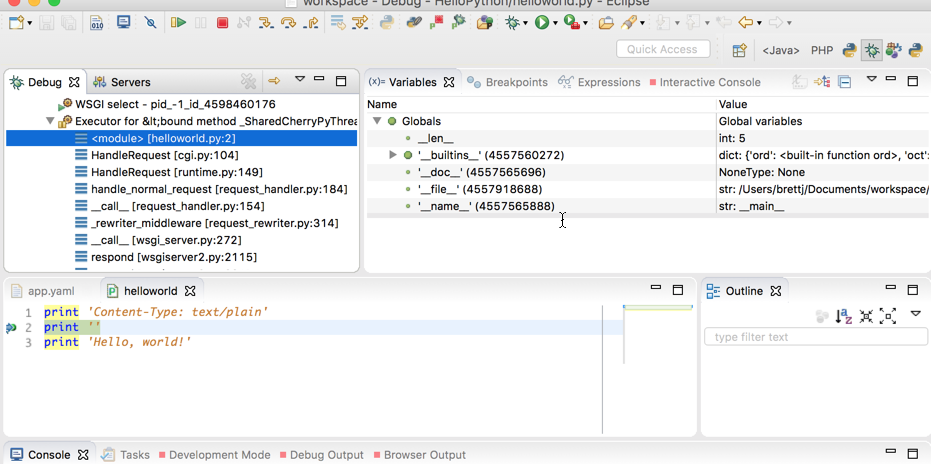5 Best Python IDE and Code Editor
BY ARINDAM – UPDATED ON JUNE 27, 2020
呃,VSC没上榜
Python is everywhere today, and it is arguably the C programming language of the modern era. You can find Python everywhere from websites, apps, data science projects, AI to the IoT devices. So being a popular programming language of this decade, it is important to know the development environment of Python where developers create applications, especially if you are starting afresh.
There are many Python development environments available with many features and utilities catering to your need. Some of them useful for beginners starting to learn Python by setting up the environment, other users for heavy Python development, and complex setups. Here, in this post, I will touch upon 5 best of them which would help you to pick one for your own need and use case.
1. Eclipse with PyDev

Eclipse is a free and open-source IDE developed by IBM. This complete IDE is used for Java and Android development, however, it supports many other programming languages including Python. You can use Eclipse with the popular PyDev plugin which enables you to convert Eclipse to a complete Python development environment. With PyDev integration in Eclipse, you will be able to do the compilation, code analysis, live debugging, interactive console access, and many more features.
- Platform: Linux
- Type: IDE
- Price: Free
- Source: Open Source
- Official Download link: PyDev, Eclipse
- Official Website: Eclipse, PyDev Plugin
Advantage
- Extensive features and complete Python development IDE.
Disadvantage
- A heavyweight on system performance.
- Targetted for advanced users.
2. PyCharm

Developed by JetBrains, PyCharm provides smart code completion, code inspections, on-the-fly error highlighting, and quick-fixes, along with automated code refactorings and rich navigation capabilities.
PyCharm’s huge collection of tools out of the box includes an integrated debugger and test runner; Python profiler; a built-in terminal; integration with major VCS and built-in database tools; remote development capabilities with remote interpreters; an integrated ssh terminal; and integration with Docker and Vagrant.
In addition to Python, PyCharm provides first-class support for various Python web development frameworks, specific template languages, JavaScript, CoffeeScript, TypeScript, HTML/CSS, AngularJS, Node.js, and more.
PyCharm has two versions of installers. The professional version and a community version. The community version is free and opensource. The professional version is not free as it comes with professional tools and extensive supports. The professional edition has a subscription version with <10 USD per month for individual use.
However, if you are a beginner, you can start with the free Community edition of PyCharm.
For both Scientific and Web Python development. With HTML, JS, and SQL support.
- Platform: Linux, Mac, and Windows
- Type: IDE
- Price: Free (Community edition) and Paid (Professional Edition)
- Source: Open Source (Community Edition)
- Official Download link
SEE ALSO: How to Setup Python Development Environment in Ubuntu and Fedora
Advantage
- Advanced and modern editing capabilities for professionals that aid rapid developments.
Disadvantage
- Most of the professional tools are available in the paid version (approx 8 to 10 USD per month for individual use).
3. Spyder

Spyder is a powerful Python editor written in Python for Python. It is designed to be used by scientists, engineers, and data scientists. It offers a unique combination of the advanced editing, analysis, debugging, and profiling functionality of a comprehensive development tool with the data exploration, interactive execution, deep inspection, and beautiful visualization capabilities of a scientific package.
- Platform: Anaconda
- Type: IDE
- Price: Free
- Source: Open Source
- Official Download link
- Official Website
Advantage
- Lightweight and Free
Disadvantage
- You have to download it as part of the Anaconda package. No standalone installer.
4. Sublime Text

Sublime Text is a sophisticated code editor with a Python programming interface. It is a cross-platform utility and natively supports many programming languages. You can extend its features and functionality using plugins. The sublime text comes with productivity-boosting features such as Goto anything, changes to multiple sections of your file simultaneously.
- Platform: Windows, Linux, OS X
- Type: IDE
- Price: Free but a license must be purchased for continuous use
- Source: Closed Source
- Official Download link
- Official Website
Advantages
- Lightweight, free, and available for Windows, Mac, and Linux.
Disadvantages
- It is free to evaluate but for advanced usage, you have to buy a license.
5. Thonny

Thonny is a beginner’s Python IDE and simple to use. It comes with the latest Python (3.7+ as of writing) built-in so that you do not need to worry about installing Python separately in your operating system. The user interface is clutterless and distraction-free for the beginners. Some of the other notable features of Thonny include – variable view, simple debugger, steps, syntax errors.
- Platform: Windows, Linux, Mac
- Type: IDE
- Price: Free
- Source: Open Source
- Official Download link
Advantages
- Lightweight, free, and available for Windows, Mac, and Linux.
Disadvantages
- Available with basic features as it is a beginner’s IDE.
There are plenty of Python editors available and these are 5 best of them. Some of the other notable Python editors which you can try as well – VIM, IDLE (comes with default Python), Cloud 9, Visual Studio Code, and eMacs.